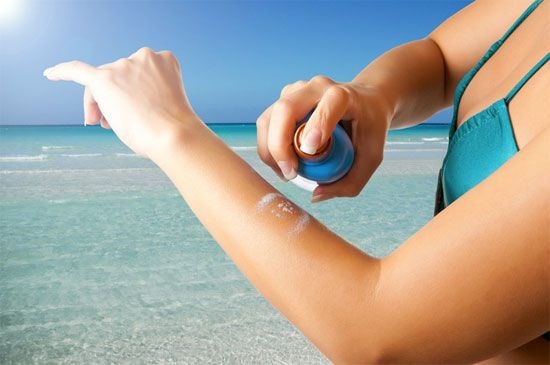Sunscreen disaster
Sunscreen is used by many women in the summer to protect their skin from the effects of sunlight. However, many people have suffered from using this cream incorrectly, even facing the risk of skin cancer.
 |
| You should choose a reputable brand of sunscreen to protect your skin in the summer. Illustration photo Infection with sunscreen |
Contaminated with sunscreen
Ms. Le Thi Hong (Ma May Street, Hoan Kiem District, Hanoi) came to the Central Dermatology Hospital for examination in a condition where her entire face, neck, arms, and legs were covered with rashes, blisters, and itching that were very uncomfortable. Ms. Hong said: “Five days ago, my family went swimming. I wanted to avoid sunburn, so I bought sunscreen for my whole body. But after about 30 minutes of applying it, my skin started to itch. Because I bought the sunscreen at a store near my house and was also an acquaintance, I called to ask. The store owner reassured me that it was because it was my first time using sunscreen, my skin was not used to it, so I had an allergic reaction. Everyone who uses it for the first time is like that, but it's okay, it just itches a little and then goes away" (?).
With the seller's reassurance, Ms. Hong felt reassured and ignored the itch, going to the beach to swim in the morning. Maybe it was because the beach was refreshing, so she didn't feel itchy anymore when swimming in the water. Convinced that everything was fine, after her morning bath, she returned to the hotel to continue applying sunscreen, but this time, right after applying the sunscreen all over her body, she felt the itchiness was worse than in the morning. She quickly used shower gel to remove the sunscreen, but by this time she had a rash all over her body, making it very uncomfortable to wear clothes. For her, her trip to the beach, which should have been very enjoyable, turned out to be very bad just because of that bottle of sunscreen.
Another case is Ms. Truong Thi Hoan (Giao Huong commune, Giao Thuy district, Nam Dinh province) who also suffered from sunscreen, although the progress was not as immediate as Ms. Hong. Ms. Hoan said: “Every summer I use that sunscreen and find it very good, so this summer I continue to buy it. In the beginning, I only applied it on my hands and feet and it was fine. But the day I went to the beach, I applied it continuously, reapplying every 2 hours and still wearing sunscreen clothes and skirts when going out in the sun. After two days of using sunscreen like that, I felt my body starting to itch, have a rash, and many blisters appeared. Some blisters even broke out and were very painful. After that, I went to the hospital and the doctor said that I had a skin infection due to using sunscreen incorrectly and abusing a cream that was not suitable for my skin.”
“I asked the doctor if this was the sunscreen I had been using safely for years, but the doctor said that not all familiar sunscreens are safe for the skin. Because over time and age, the skin changes and can become weaker than before, so it is understandable that it would be irritated by a familiar sunscreen,” Ms. Hoan added.
Self-treating allergies from creams can cause skin cancer
Dr. Nguyen Thanh, former Head of the Examination Department (Central Dermatology Hospital) said that summer is the time when women use sunscreen the most, so this is also the time when his clinic receives a sharp increase in patients coming to see a doctor due to sunscreen allergies. Most of the time, it is due to using sunscreen incorrectly, using poor quality creams or self-treatment after being allergic to sunscreen, making the condition worse. These cases, if not treated promptly, can lead to skin cancer.
Dr. Nguyen Thanh recommends that you should base on the SPF index (which shows the time the sunscreen can protect the skin) to apply enough to have effective sun protection. With SPF from 15 or higher, if applied on the face, only about 2.5g of cream is enough. If you apply less (or more) cream, it will not be effective in sun protection. Applying too much cream will clog the skin pores, causing irritation and allergies. Applying too little cream will not be enough sun protection.
Dermatologists also advise that the skin on the face and neck is more vulnerable than other parts of the body. Therefore, it is necessary to choose a sunscreen suitable for this area of skin. If you use sunscreen every day, you should choose a product with an SPF of 15-20. If you go to the beach, you should choose a sunscreen with an SPF of 30 or higher. After using sunscreen, you need to clean your skin and before using the cream, you must also make sure your skin is clean.
Experts recommend not using sunscreen products with SPF that is too high, as the chemicals in the product will combine with sweat and cause side effects such as red skin, itchy rashes, acne, etc. People with problematic skin should be examined by a dermatologist and advised on the appropriate sunscreen.
To best protect your skin when going to the beach, you need to reapply sunscreen every 2 hours to achieve the desired effect. However, it is not necessary to apply too much, just apply a thin layer. Apply sunscreen at least 15 minutes before going out in the sun.
To best protect your skin, you should not wait until summer to use sunscreen. Scientific evidence has shown that this cream is necessary regardless of the season. Especially in the summer, which is the time for beach tourism, using sunscreen for beach trips is very necessary and must be used appropriately and correctly to be effective.
According to Giadinh.net






